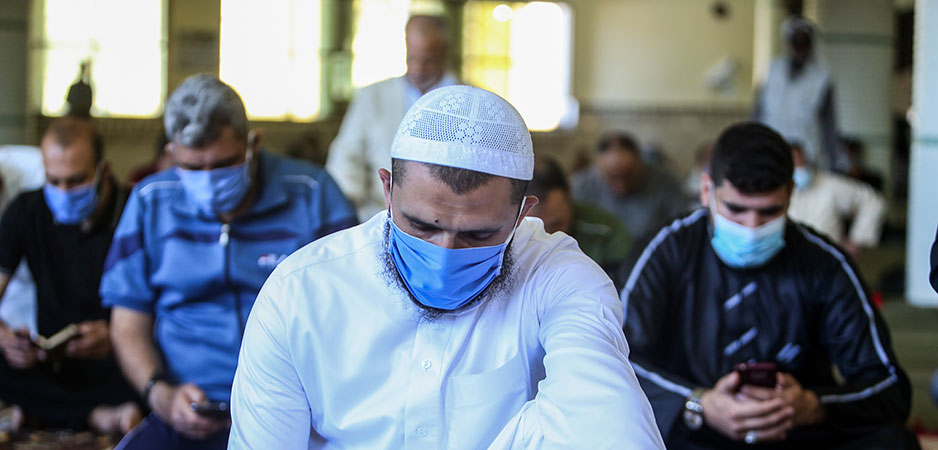For the past decade, I have been researching the impact of Islamophobia on social media. After the outbreak of COVID-19, I was commissioned, alongside my colleague Roxana Khan Williams, by the chair and independent members of the Anti-Muslim Hatred Working Group to produce an evidenced-based research report that looks at the impacts of conspiracy theories perpetuated by the radical right and how these norms have impacted Muslims.
For me, it was very clear that COVID-19 could be acting as a trigger event that would galvanize hatred against Muslims, but I needed to find out whether this has already started amid the pandemic. After examining a range of social media posts, we found that Islamophobic tropes pushed the narrative that Muslims were solely responsible for spreading COVID-19. This narrative was perpetuated by, firstly, dehumanizing Muslims; secondly, through creating a “them and us” narrative; and, finally, by driving forward the message that Muslims are not to be trusted.
London’s “Mega Mosque:” Islamophobia in the COVID-19 “New Normal”
It was clear that some of these narratives being pushed by the radical right had created Islamophobic online cyber hubs that had linked Muslims to the spread of COVID-19. This was being shown through the visual anti-Muslim memes and fake news stories shared across social media.
We also found a shift in online trends that started by arguing that Muslims were superspreaders of the virus and then quickly moving on to the notion that they were also to blame for the virus in the first place. For example, according to digital human rights group Equality Labs, the hashtag #CoronaJihad had appeared nearly 300,000 times in global conversations on mainstream social media sites (excluding Facebook) in just one week between March 31 and April 6.
In Britain, one video, shared on the Tommy Robinson News channel on the messaging app Telegram, alleges to show a group of Muslim men leaving a secret mosque in Birmingham to pray. Despite the fact the video is fake and West Midlands Police have confirmed the mosque is closed, it has been watched over 14,000 times.
These issues led to offline incidents because people have used fake narratives on social media to portray all Muslims as being part of the problem. For example, in another viral tweet posted on March 26, a user claimed to have spoken to his local mosque in Shrewsbury, UK, and was “horrified” to find that this Mosque was still open. He added that the people inside could be “super spreaders” of the virus and urged the police to act.
After a fact-finding exercise, it was quickly revealed by the police that there was no mosque in Shrewsbury. This example, along with numerous others, reveals how individuals can create fake news stories which, if left unchecked, can spread quickly on social media. We also found that online narratives were rooted in anti-Muslim bigotry through the dehumanization of Muslims. These themes of dehumanization also link back to how Muslims are being described as “vermin” and “disease.”
We also found the depiction of British Muslims on social media becoming synonymous with them being a “risky and problem-group.” A number of fake news stories featured claims that Muslims are flouting social distancing measures to attend mosque. One picture, for example, taken outside a Leeds mosque, appears to show Muslims breaking the rules of lockdown despite this having been taken two weeks before the official lockdown began.
Overall, the COVID-19 pandemic has created unity among groups and communities that have come together at this unprecedented moment. However, at the same time, it has caused wider divisions among smaller communities and groups, and has been used as a weapon by the radical right in promoting conspiracy theories, raising questions about how our society can come together to tackle the ills of social media.
As lockdown measures ease, the worry is that we will start to see a rise in offline incidents. Unless we can get to grips with people’s attitudes online, we risk seeing more problems emerge. Social media companies can do much better and start the process of identifying perpetrators and working with the police and other agencies to combat the rise of Islamophobia online.
*[Fair Observer is a media partner of the Centre for Analysis of the Radical Right.]
The views expressed in this article are the author’s own and do not necessarily reflect Fair Observer’s editorial policy.
Support Fair Observer
We rely on your support for our independence, diversity and quality.
For more than 10 years, Fair Observer has been free, fair and independent. No billionaire owns us, no advertisers control us. We are a reader-supported nonprofit. Unlike many other publications, we keep our content free for readers regardless of where they live or whether they can afford to pay. We have no paywalls and no ads.
In the post-truth era of fake news, echo chambers and filter bubbles, we publish a plurality of perspectives from around the world. Anyone can publish with us, but everyone goes through a rigorous editorial process. So, you get fact-checked, well-reasoned content instead of noise.
We publish 2,500+ voices from 90+ countries. We also conduct education and training programs
on subjects ranging from digital media and journalism to writing and critical thinking. This
doesn’t come cheap. Servers, editors, trainers and web developers cost
money.
Please consider supporting us on a regular basis as a recurring donor or a
sustaining member.
Will you support FO’s journalism?
We rely on your support for our independence, diversity and quality.






